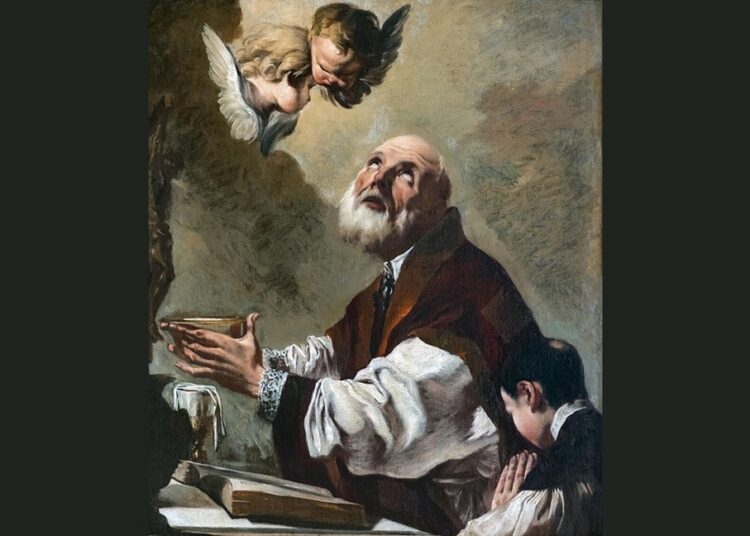St. Philip Neri
“Go take a hike out passed the Catacombs
of St. Callistus. Celia once was there.
Cornelius is and other Popes in domes
of ancient stone. Inhale the olive air.
Then buy a chicken from a chicken-farm
and bring it back to me the way you came.
Transport it in the crook of your left arm.
You’re not the first. Others have done the same.
Pluck all the feathers of the butchered bird
along the Appian Way and Roman paths.”
She thought the penance wildly absurd.
The saints, she thought, know how to get their laughs…
When she returned he told her what was next:
“Go regather each feather you plucked-out.”
She looked at him bemused and quite perplexed:
“But Father—that’s impossible; no doubt…”
“Likewise, my dear, we can’t take gossip back.
So change your ways and do what Christ would do.”
A brilliant priest who had a special knack.
That night he fed the poor with chicken-stew.
Reid McGrath lives and writes in the Hudson Valley Region of New York.

















Cute moral story with a surprise practical ending. Just the lyric genre to choose, Reid, for the fun-loving Pippo Buono. Think you might want “past” rather than “passed” in the first line. Or is it meant to give a kindly rebuke to those of us who may be sticklers for spelling and grammar?
Thank you, Margaret. No, you are right, it should be “past.” “Passed” was from an earlier rendering. I’ll change my copy at home.
Reid, what a colorful story and poem! You have made the gossip penance come alive. The idea of using a chicken plucked of its feathers for a lesson is a great one with the making of chicken stew a surprise ending increasing my admiration for St, Philip Neri and your poem. You write eloquently.
One of my favorite stories from one of my favorite saints, set charmingly to verse. Just the right length, too, to drive home the point.
Reid, a very enjoyable read of penance in a poem.
Loved the poem and its perfect ending. I’ve always thought prayers were not an ideal penance because it makes them into punishment.
Your poem humanizes the Saint and humorously. I must agree with the suggestion for “passed”.
Thank you, everyone. “Passed” was from an earlier rendering. I’ll definitely change that to “past.” Kudos for the heads up.
This deceptively simple poem evokes a deep spiritual journey under the guise of a mundane errand. At first glance, it reads like a casual directive—”go take a hike”—but what follows reveals layers of ritual, memory, and transformation. The path past the Catacombs of St. Callistus isn’t merely physical; it’s historical and sacred, traversing the buried lives of saints and popes, like Celia and Cornelius, whose identities whisper from the tombs of time.
“Inhale the olive air” serves as a quiet moment of communion—not just with nature, but with the enduring presence of the holy in the everyday. The olive, an ancient symbol of peace, sacrifice, and anointing, connects the earth to the sacred.
Then, unexpectedly, the task becomes tactile and absurdly humble: “Buy a chicken.” The juxtaposition of sacred ground and domestic chore is striking—and telling. Holiness is not found only in relics or incense-filled chapels; it lives in the ordinary, the living, the carried.
Carrying the chicken in the crook of one’s arm, as others have done, becomes a rite of passage. There is tradition here—perhaps absurd, perhaps profound—but rooted in obedience, humility, and continuity. The mundane becomes sacramental. Through this quiet, strange pilgrimage, the soul may be led not to a grand revelation, but to the holiness of the small act done with reverence.
St. Philip Neri, the “humorous saint,” would approve. This poem is both a wink and a benediction.
Daniel, wow. That was awesome. I’m going to save this and add it as a footnote. Much appreciated, man.